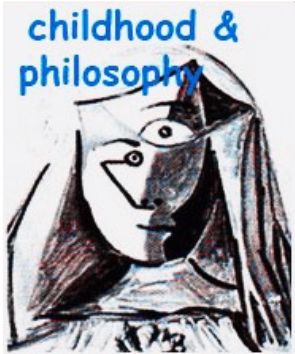“You Talk and Try to Think, Together” – A Case Study of a Student Diagnosed with Autism Spectrum Disorder Participating in Philosophical Dialogues
DOI:
https://doi.org/10.12957/childphilo.2023.70493Keywords:
autism spectrum disorder, communication difficulties, philosophy for children, philosophy with children, philosophical dialogueAbstract
Abstract
We present results from a single case study based on semi-structured interviews with a student (a boy in school year 3) diagnosed with autism spectrum disorder and his school staff after participating in a short and small-scale intervention carried out in a socio-economically disadvantaged Swedish elementary school in 2019. The student participated in a seven week long long intervention with a total of 12 philosophical dialogues (ranging from 45 to 60 minutes). Two facilitators, both with years of facilitation experience and teacher degree and at least BA in philosophy, facilitated the majority of the dialogues, mainly followed a ”routine” procedure. The student was interviewed in direct connection to the end of the intervention about his experiences from the dialogues and his perceptions about wether and how the dialogues had influenced him. The student’s two teachers, who had participated in the dialogues as participants, were interviewed as a pair, also in direct connection to the end of the intervention, while the school principal was interviewed two years after the study. These staff interviews concerned the staff’s experiences of the influence of the dialogues on the students within the intervention as well as transfer effects to other contexts in school. The data from the study include detailed elaborations from a student perspective of different effects on the student’s communicative and cognitive development, which are in several respects supported also by staff reports. The results show that the student was able, interested, and willing to participate in philosophical dialogues, and our data point to several positive outcomes for the student in the communicative and cognitive domains.
Downloads
References
Backman, Y., Gardelli, T., Gardelli, V., & Strömberg, C. (2020). Group Argumentation Development through Philosophical Dialogues for Persons with Acquired Brain Injuries. International Journal of Disability, Development and Education, 67(1), 107–123. http://doi.org/10.1080/1034912X.2019.1681377
Backman, Y., Reznitskaya, A., Gardelli, V., & Wilkinson, I. A. G. (2023). Beyond Structure: Using the Rational Force Model to Assess Argumentative Writing. Written Communication, 40(2), 555–585. https://doi.org/10.1177/07410883221148664
Bryman, A. (2018). Samhällsvetenskapliga metoder. Malmö: Liber.
García Moriyón, F., Rebollo, I., & Colom, R. (2005). Evaluating philosophy for children: A meta-analysis. Thinking: The Journal of Philosophy for Children, 17(4), 14–22. https://doi.org/10.5840/thinking20051743
Gardelli. V. (2016). To describe, transmit or inquire: Ethics and technology in school. Luleå University of Technology. Retrieved from http://ltu.diva-portal.org/smash/get/diva2:999077FULLTEXT01.pdf
Gorard, S., Siddiqui, N., & See, B. H. (2015). Philosophy for Children (pp. 1–45). Education Endowment Foundation.
Hattie, J., & Zierer, K. (2019). 10 Mindframes for Visible Learning. Natur & Kultur.
Kizel, A. (ed.) (2022). Philosophy with Children and Teacher Education: Global Perspectives on Critical, Creative and Caring Thinking. Routledge.
Lewis, J. (2009). Redefining Qualitative Methods: Believability in the Fifth Moment. International Journal of Qualitative Methods, 8(2), 1–15.
Lipman, M. (2003). Thinking in Education. Cambridge University Press.
Lipman, M., & Sharp, A. M. (1978). Growing up with philosophy. Temple University Press.
Lipman, M., Sharp, A. M., & Oscanyan, F. S. (1980). Philosophy in the Classroom. Temple University Press.
Lukey, B. (2004). Rethinking Dialogue: Reflections on P4C with Autistic Children. Thinking: The Journal of Philosophy for Children, 17(1), 24–29.
Murphy, K., Wilkinson, I., Soter, A., Hennessey, M., & Alexander, J. (2009). Examining the effects of classroom discussion on students’ comprehension of text: A meta-analysis. Journal of Educational Psychology, 101(3), 740–764. https://doi.org/10.1037/a0015576
Reznitskaya, A., & Wilkinson, I. A. G. (2017). The Most Reasonable Answer. Cambridge, MA: Harvard Education Press.
Stemler, Steven E. (2004). A Comparison of Consensus, Consistency, and Measurement Approaches to Estimating Interrater Reliability. Practical Assessment, Research, and Evaluation, 9(4), 1–11.
Topping, K. J., & Trickey, S. (2007a). Collaborative philosophical enquiry for school children: Cognitive effects at 10–12 years. British Journal of Educational Psychology, 77(2), 271–288. http://doi.org/10.1348/000709906X105328
Topping, K. J., & Trickey, S. (2007b). Impact of philosophical enquiry on school students’ interactive behaviour. Thinking Skills and Creativity, 2(2), 73–84. http://doi.org/10.1016/j.tsc.2007.03.001
Trickey, S., & Topping, K. J. (2004). ’Philosophy for children’: A systematic review. Research Papers in Education, 19(3), 365–380.
Trickey, S., & Topping, K. J. (2006). Collaborative Philosophical Enquiry for School Children: Socio-Emotional Effects at 11 to 12 Years. School Psychology International, 27(5), 599–614. http://doi.org/10.1177/0143034306073417
Yan, S., Walters, L. M., Wang, Z., & Wang, C. (2018). Meta-analysis of the effectiveness of philosophy for children programs on students’ cognitive outcomes. Analytic Teaching and Philosophical Praxis, 39(1), 13–33.




